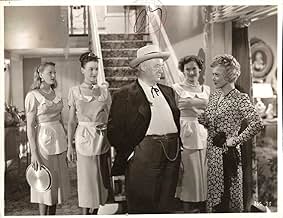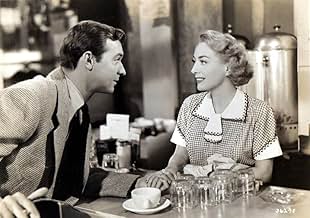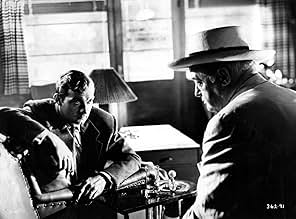A corrupt small town sheriff manipulates local candidates to the state legislature but he eventually comes into conflict with a visiting carnival dancer.A corrupt small town sheriff manipulates local candidates to the state legislature but he eventually comes into conflict with a visiting carnival dancer.A corrupt small town sheriff manipulates local candidates to the state legislature but he eventually comes into conflict with a visiting carnival dancer.
- Awards
- 2 wins total
- Blanche - Inmate of Women's Prison
- (uncredited)
- Leo Mitchell
- (uncredited)
- Reporter
- (uncredited)
- Martin
- (uncredited)
- Johnny Simms
- (uncredited)
- Nightclub Patron
- (uncredited)
- Waitress
- (uncredited)
Featured reviews
This film is a bit of an odd style, as in many ways it's like a trashy Soap Opera combined with Film Noir. The dialog is among the best I have heard and is very Noir-like--so many snappy comebacks and the dialog just crackles. And, fortunately, all the Soap elements are far less predictable than you'd think---as again and again, the characters did NOT do what you'd expect.
The bottom line is that this is a quality production with exceptional acting, script and mood throughout. Provided you like older films, it's hard to imagine a person not liking this movie.
This must have been a vehicle for the star right after her star turn in Mildred Pierce. It has some of the same people behind it, like director Michael Curtiz and Zachary Scott. The dialogue is something to be treasured. They don't make films like this anymore. Just imagine what panache Ms Crawford brought to anything she appeared in.
The cast that was assembled for this film is probably impossible to match. The great Sydney Greenstreet is so good as the evil sheriff Titus Semple, that we stay riveted looking at his every move. David Brian as the man who loves Lane and rescues her from poverty is also an asset. The minor players, Gladys George, Fred Clark and Virginia Huston, among others fit right into the story.
But this is a Joan Crawford's film. She dominates every scene in which she appears. What power she conveys with only an economy of gestures. No one working in films these days can come near to this actress, who left her own imprint in the canon of American cinema, not to be equaled by anyone any time soon.
Owing to unpaid bills or some such, the traveling show, in which Crawford was a steamy if not entirely fresh attraction, blows town. Sheriff's deputy Zachary Scott, sent across the tracks to make sure the whole unsavory business has packed up, finds only Crawford, listening to her radio in a mildewed tent. Sparks are struck; he invites her back to town for the blue-plate special in the local beanery and finagles a job for her there as a waitress.
His superior, corrupt sheriff Sydney Greenstreet, sniffs out the burgeoning romance and vows to quash it; he has plans to run Scott for the senate of their anonymous Gulf state (its capital is Olympic City and its capitol a lovingly detailed piece of scenery painting), prerequisite to which is a proper marriage to a bona-fide local girl. Scott glumly acquiesces to the plan, drowning his doubts in drink ("I crawled into a bottle and can't get out"), while Greenstreet frames Crawford on a morals charge and runs her out of town.
New to the mix is David Brian, boss of the state political machine, whose eye is caught by Crawford (now back in town working in the obligatory "roadhouse" operated by Gladys George). He has a whopper of a hangover ("A party's like insurance the older you are, the more it costs," he says), which Crawford assuages with an eye-opening whiskey sour followed by a home-cooked breakfast. Never underestimate the power of a well-scrambled egg. Next thing, they're married and living in a mansion on high-toned Flamingo Road (complete with a housemaid with the voice and the brain of a parakeet, as in the earlier Curtiz/Crawford Mildred Pierce, except that this time she's not Butterfly McQueen and is, amazingly for the era, white). But Greenstreet starts pulling even filthier strings than Brian for once, a passably good egg can countenance. Whereupon, after a drastic development involving the besotted Scott, Crawford slips a handgun into her clutch-bag and pays Greenstreet an amicable visit....
With at least two sensational movies behind him (Casablanca and Mildred Pierce), and one ahead of him (The Unsuspected), Curtiz can be forgiven for Flamingo Road. He brings it some verve, but its identity as yet another of Crawford's rags-to-riches vehicles gets the better of him. While his star supplies some startlingly naturalistic acting (and while the uncharacteristically clean-shaven Scott and the characteristically portly Greenstreet are dependably professional), Flamingo Road has fallen, rather unarguably, into the disreputable if transfixing gulch called camp. Not that there's anything wrong with that.
Max Steiner contributes his usual melodically overwrought score (with heavy reliance on the popular song, "If I Could Be One Hour With You [Tonight]"), lushly orchestrated by Murray Cutter, under the musical direction of that Warners stalwart, Ray Heindorf. It's almost too distracting but the frequently crackling dialogue keeps the audience's attention focused on the pulpy proceedings. Ted McCord's black-and-white cinematography is an outstanding example of why not every picture should be in color and I suspect that it was Travilla who was given the task of gowning Crawford once she'd finally crossed over to the right side of the tracks. (Sheila O'Brien, also credited, probably ran up those nifty waitress uniforms and the prison garb Crawford gets to wear not once, but twice!)
They really, REALLY don't make 'em like this anymore, and thank goodness Turner Classic Movies, for instance, trundles a tasty morsel like this out of their archives every once in a while for us to savor once again.
Did you know
- Trivia"Flamingo Road" was originally intended as a vehicle for Ann Sheridan, who turned down the role played by Joan Crawford. Sheridan felt the script was poor and it was not faithful to the book it was based upon.
- GoofsNear the end, a mob forms in front of Lane Bellamy's home. The mob is not seen, but dozens of people outside are heard making verbal threats. The next scene is her driving away, somehow having avoided a confrontation outside with the mob.
- Quotes
Sheriff Titus Semple: Now me, I never forget anything.
Lane Bellamy: You know sheriff; we had an elephant in our carnival with a memory like that. He went after a keeper that he'd held a grudge against for almost 15 years. Had to be shot. You just wouldn't believe how much trouble it is to dispose of a dead elephant.
- Crazy creditsThe opening credits are presented on a book as someone turns the pages.
- ConnectionsFeatured in Joan Crawford: The Ultimate Movie Star (2002)
- SoundtracksIf I Could Be with You
(uncredited)
Music by James P. Johnson
Lyrics by Henry Creamer
Sung by Joan Crawford in the tent and at Lute Mae's Tavern
Also performed by an unidentified singer at the Rendezvous Room
Played often in the score
- How long is Flamingo Road?Powered by Alexa
Details
- Release date
- Country of origin
- Language
- Also known as
- Flamingo Road
- Filming locations
- Production companies
- See more company credits at IMDbPro
Box office
- Budget
- $1,528,000 (estimated)
- Runtime
- 1h 34m(94 min)
- Color
- Aspect ratio
- 1.37 : 1









































